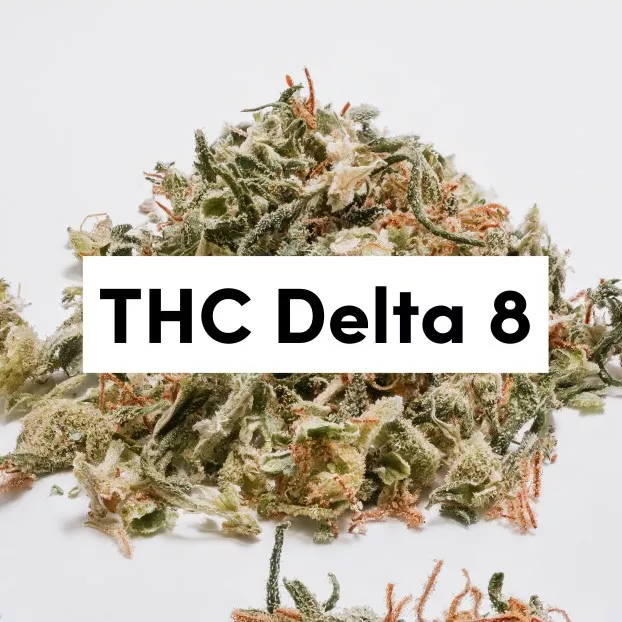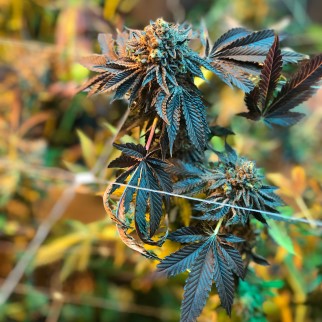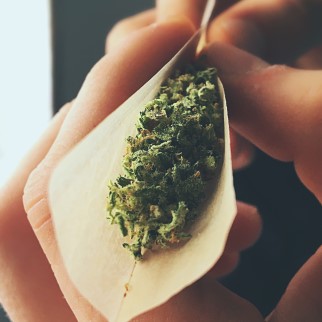THC is the primary psychoactive element found inside the cannabis plant. But there are actually different variations of the compound known as THC. Scientists often refer to THC as delta-9-tetrahydrocannabinol, Delta 9, D9, delta-9-THC, or (−)-trans-Δ⁹-tetrahydrocannabinol. However, researchers came up recently with a new THC compound they labeled THC Delta-8. How does this new variation differ from Delta-9-THC? Is it only the slightly different name, or is there something else that makes it different? To know that, it’s essential to understand the structure of THC Delta-8 first.
What is THC Delta 8?
Like Delta-9-THC, Delta-8 also has various ways to spell its name, such as delta-8-THC, Δ8 THC, delta-8, D8, and Delta 8. Most people may not have heard about Delta-8 because, for most people, it is still a reasonably new compound that just hit the cannabis market. According to researchers, Delta-8-THC was around since at least 1975. Back then, scientists discovered that Delta-8-THC could shrink cancer cells efficiently in rats.
According to the National Cancer Institute, Delta-8-THC is an analog of tetrahydrocannabinol that comes with neuroprotective, anxiolytic, analgesic, antiemetic, and appetite-stimulating properties. It binds to the cannabinoid G-protein present in the CB1 receptor of the endocannabinoid system. Cannabinoid G-protein is an element that has a lower psychotropic potency compared to Delta-9-THC. This means users won’t experience the same high feeling by consuming THC Delta-8 as you would with Delta-9-THC.
Moreover, there are some chemical differences between Delta-8 and Delta-9. Delta-8 contains a few more atomic bonds than Delta-9, which makes it more potent. However, Delta-8 also only exists in fractions of a percent. That little detail works as an advantage for companies involved in manufacturing THC products. Their products might make use of THC Delta 8 to boost the potency of other cannabinoids’ extracts.
Making Delta-8-THC
Manufacturers use a thin film distillation process to make THC Delta 8. Later, the compound goes through fractional distillation to isolate the Delta-8 in it. The makers accomplish these steps through variations of vacuum and temperature. In fact, they can convert Delta-9-THC to Delta-8-THC using that same process. It also helps to deliver the purest isolate as temperature and vacuum variations remove residual solvents, undesirable compounds, and impurities. Most of the cannabis flowers contain less than 1% Delta-8-THC. This is why it quite some time to extract the compound. Manufacturers usually derive Delta-9-THC and then convert it to Delta-8 using the aforementioned conversion process.
Similarities and Differences Between Delta-8 and Delta-9
The chemical structure of THC Delta-8 is slightly different from Delta-9. It contains a critical chemical bond that makes Delta-8 superior. However, both these compounds usually have a similar molecular chain. They contain double bonds. Delta-8 has a double bond on its 8th carbon chain. Delta-9, on the other hand, has a double bond on its 9th carbon chain. That is from where they get their respective names. At the same time, it may seem a slight change that makes a world of difference in each of their respective effects. The location of the double bond changes how a person’s endocannabinoid receptors bind to these molecules, react to them, and, ultimately, the effects it delivers.
According to scientists, Delta-9 is also not as stable as Delta-8-THC. It oxidizes easily and becomes CBN or cannabinol. On the other hand, Delta-8’s edge is not only stable but also doesn’t oxidize as quickly. In fact, it has a prolonged shelf life, one of the factors that make Delta-8 superior to Delta-9 when it comes to medical use. Most importantly, Delta-8 isn’t as strong as Delta-9. Thus, users won’t feel high or stoned after consuming the compound.
Mechanism of Action
Apart from the difference in chemical structure, Delta-8 also differs from Delta-9 in its mechanism of action. First of all, Delta-8 primarily connects to CB1 receptors. While Delta-9 also binds to CB1 receptors, Delta-8’s affinity towards CB1 is slightly different due to its molecular structure. The CB1 receptors react the most when it comes to the psychotropic effects of THC. That is why consuming THC with Delta-9 compounds delivers its signature euphoric feeling, which often results in impairment.
Delta-8 does not, which makes it ideal for medicinal purposes. Researchers and scientists believe that THC with Delta-8 compounds is far better at dealing with anxiety than THC with Delta-9. They also think that the unique molecular structure of Delta-8 may impact the chemical reactions of other neural pathways and receptors.
Entourage Effect
According to enthusiasts, THC molecules work best when still mixed with terpenoids, cannabinoids, and flavonoids. Researchers suggest that this combination delivers the perfect therapeutic effects that isolated THC cannot produce. This is the entourage effect.
For now, scientists only have much data on the entourage effect of Delta-9. But when they compare the properties and molecular structure of Delta-8, it shows the potential to provide even better effects. This so far is the only speculation based on the different chemical structure of THC Delta 8. Still, scientists need to research more to conclude whether the entourage effects of Delta-8 are indeed better than Delta-9 or not.
Medical Potential
Various clinical and preclinical studies provide interesting facts regarding the properties of Delta-8 and Delta-9. They also show how Delta-8 has therapeutic potential because of its molecular structure.
1. Pain and anti-inflammatory effects
One of the reasons why a huge part of society wants countries to legalize weed is because of its potential anti-inflammatory effects. True enough. But all the compounds don’t have that property. Fortunately, Delta-8 manages to show positive reactions in diminishing pain and inflammation. This was according to the preclinical study in 2018 published in the Cannabis and Cannabinoid Research.
According to this research, applying Delta-8-THC helped to reduce pain and inflammation. The compound worked with CB1 receptors to lower the pain. However, this study used mice as a subject. Another preclinical study reported that Delta-8-THC did help relieve pain in rats, but the animals developed tolerance to the compound somewhat quickly.
2. Anxiety
Both Delta-8 and Delta-9 may help to reduce anxiety. The only difference in their effects is the former doesn’t come with any side-effects. Delta-9, on the other hand, makes the user feel drowsy. It can put the user to sleep by calming the nerves within a few minutes. While many may feel it’s the ideal medicine for them, scientists think that Delta-8 has an edge over Delta-9 in this. THC Delta 8 doesn’t make the user experience drowsiness but still does provide a similar effect to Delta-9.
A journal published by the U.S. National Library of Medicine indicates that Delta-8 displays anxiety-reducing qualities just like its counterpart. However, there is little clinical literature describing the efficacy of both these compounds in detail so far. Anecdotal reports claim that consuming Delta-8 makes the user calm and focused instead of euphoric, which is the case with Delta-9-THC.
3. Anti-nausea effects
Some people consume THC to fight nausea regardless of knowing whether it has Delta-8 or Delta-9 in it. According to a study published in Life Sciences in 1995, Delta-8 has Anti-nauseant potential. The experiment had eight pediatric cancer patients as subjects for over two years. The study concluded that the patients did not experience nausea as long as they ingested Delta-8-THC before and after chemotherapy.
In fact, there were further claims that none of the patients experienced any side-effects after ingesting this Delta 8. That was a hint reading’s Delta-8 possible suitability for cancer patients to help treat nausea and the pain due to treatment. Antinausea effects are also part of the reason researchers reassessed THC’s medical potential in the first place.
4. Appetite stimulant
Without fail, people often feel hungry after smoking a joint. This might be because the cannabis they smoke contains Delta-8-THC, which stimulates the appetite. Multiple research conducted on rats suggests that even a low dose of Delta-8-THC can result in a 22% increase in their food intake afterward. It is understandable how the same may affect humans and why smokers feel hungry after consuming Delta-8-THC.
This is where THC Delta 8 edges past Delta-9-THC significantly. Delta-9, as many research backs it up, is a reputed appetite stimulant. Yet, it might fall short of Delta-8 upon comparison.
Side-Effects
There’s always a seemingly endless conversation regarding if consuming THC is safe or not. Honestly, CBD might be a much better compound for you if you are exclusively looking for therapeutic benefits. It doesn’t give users the high that THC provides. Moreover, CBD is available in different presentations like tinctures, gummies, creams, and lotions. Does that mean THC has nothing to offer in comparison? The answer depends on which kind of THC you choose.
Delta-9-THC is not the best choice, considering the impairment it will cause you. That leaves people with the choice of trying THC Delta 8. The main reason being that it does not give out the signature high that could prevent you from functioning correctly for a while. Moreover, its therapeutic benefits show hints of actually being more powerful than those of Delta 9. So, if you have the chance to choose Delta-8 and Delta-9, know that the former might have just so much more to offer you.


